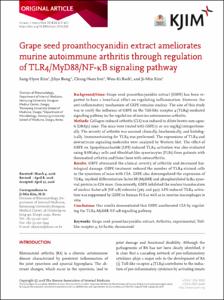Grape seed proanthocyanidin extract ameliorates murine autoimmune arthritis through regulation of TLR4/MyD88/NF-kB signaling pathway
- Keimyung Author(s)
- Baek, Won Ki; Kim, Sang Hyon; Kim, Ji Min; Son, Chang Nam
- Journal Title
- Korean Journal of Internal Medicine
- Issued Date
- 2018
- Volume
- 33
- Issue
- 3
- Abstract
- Background/Aims:
Grape seed proanthocyanidin extract (GSPE) has been reported to have a beneficial effect on regulating inf lammation. However, the anti-inflammatory mechanism of GSPE remains unclear. The aim of this study was to verify the influence of GSPE on the Toll-like receptor 4 (TLR4)-mediated signaling pathway in the regulation of murine autoimmune arthritis.
Methods:
Collagen-induced arthritis (CIA) was induced in dilute brown non-agouti (DBA)/1J mice. The mice were treated with GSPE (0 or 100 mg/kg) intraperitoneally. The severity of arthritis was assessed clinically, biochemically, and histologically. Immunostaining for TLR4 was performed. The expressions of TLR4 and downstream signaling molecules were analyzed by Western blot. The effect of GSPE on lipopolysaccharide (LPS)-induced TLR4 activation was also evaluated using RAW264.7 cells and fibroblast-like synoviocytes (FLSs) from patients with rheumatoid arthritis and from those with osteoarthritis.
Results:
GSPE attenuated the clinical severity of arthritis and decreased histological damage. GSPE treatment reduced the number of TLR4-stained cells in the synovium of mice with CIA. GSPE also downregulated the expression of TLR4, myeloid differentiation factor 88 (MyD88) and phosphorylated IκBα synovial protein in CIA mice. Concurrently, GSPE inhibited the nuclear translocation of nuclear factor-κB (NF-κB) subunits (p65 and p50). LPS-induced TLR4 activation was suppressed by GSPE in human FLS as well as in murine macrophages in vitro.
Conclusions:
Our results demonstrated that GSPE ameliorated CIA by regulating the TLR4-MyD88-NF-κB signaling pathway.
- Publisher
- School of Medicine (의과대학)
- Citation
- Sang-Hyon Kim et al. (2018). Grape seed proanthocyanidin extract ameliorates murine autoimmune arthritis through regulation of TLR4/MyD88/NF-kB signaling pathway. Korean Journal of Internal Medicine, 33(3), 612–621. doi: 10.3904/kjim.2016.053
- Type
- Article
- ISSN
- 1226-3303
- Appears in Collections:
- 1. School of Medicine (의과대학) > Dept. of Internal Medicine (내과학)
1. School of Medicine (의과대학) > Dept. of Microbiology (미생물학)
- 파일 목록
-
-
Download
 oak-2018-0535.pdf
기타 데이터 / 2.07 MB / Adobe PDF
oak-2018-0535.pdf
기타 데이터 / 2.07 MB / Adobe PDF
-
Items in Repository are protected by copyright, with all rights reserved, unless otherwise indicated.